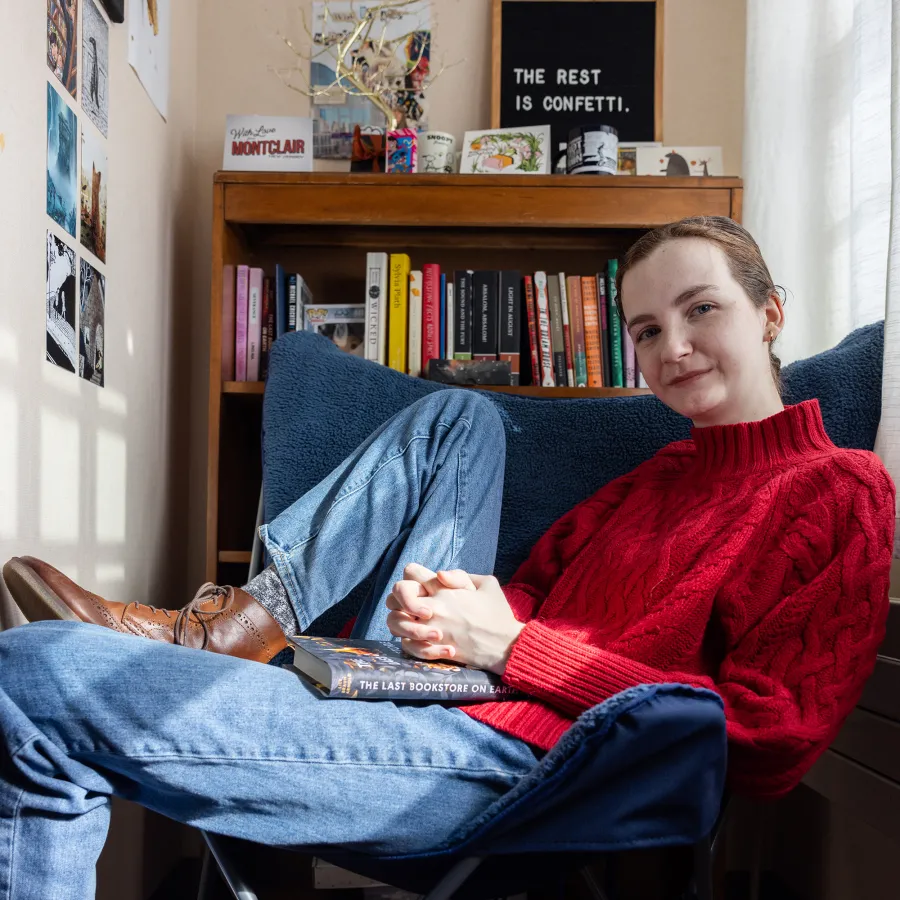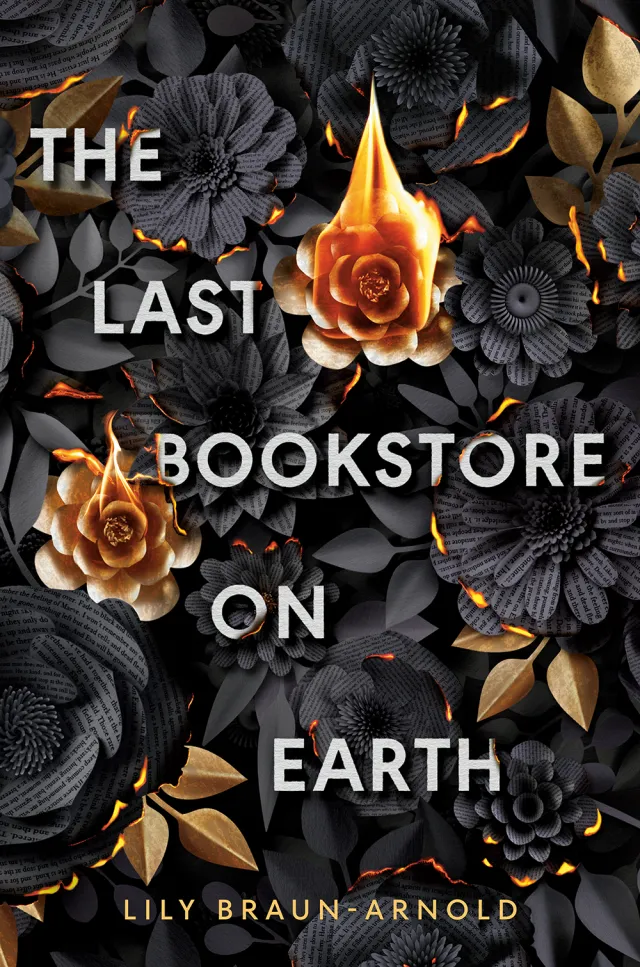Writing the Apocalypse‚ One Book at a Time
Smith Quarterly
A debut novel by Lily Braun-Arnold ’26 becomes a New York Times bestseller
Photo by Jessica Scranton
Published February 28, 2025
When Lily Braun-Arnold arrived on campus in the fall of 2022, she came with one extra item on her first-year to-do list—negotiate a book deal. Her debut novel, The Last Bookstore on Earth, released this past January by Delacorte Press, became an instant New York Times bestseller as well as a Barnes & Noble YA Book Club pick.
Set in a world decimated by catastrophic storms, The Last Bookstore on Earth follows 17-year-old Liz, who has been living in the crumbling abandoned bookstore where she used to work, when another teenage girl, Maeve, sneaks in looking for a place to stay. The two form an uneasy alliance, eventually fall in love, and struggle to survive as another storm threatens to finish off the world for good this time. Kirkus Reviews writes, “This stellar debut is filled with cynical and witty characters who are exploring the nature of and need for human connection.”
A New Jersey native, Braun-Arnold decided to start writing books during the pandemic lockdown. She was 15 at the time. Prior to completing The Last Bookstore on Earth, she wrote two “horrible” novels—all before graduating from high school.
The Last Bookstore on Earth has generated buzz beyond the book world: Braun-Arnold has been featured in multiple interviews and TV appearances, including on CBS News. In this conversation, she shares how the book deal came together and where she hopes to go from here.
You wrote two novels before The Last Bookstore on Earth. What did you learn from that experience?
They were totally different in terms of characters and plot, but they were all apocalyptic because that’s what I am obsessed with. The themes in each of them were very similar because the apocalypse lends itself to certain themes of fear of the future, uncertainty, and community. So that carried through, but the first two were horrible and should never see the light of day. The Last Bookstore on Earth worked in a way that the other ones didn’t. I think that was because of the bookstore; it added another element that made it a bit more tangible for people.
What inspired you to start writing books in the first place?
I always thought one day I would write books and it would be so fun and cool—but I never actually did it. Because of COVID, I suddenly had this abundance of time. So every day I would sit and write, forcing myself to hit a certain word count. At first, I wrote 2,000 words a day.
Did the act of writing feel as exciting as you expected it to be?
I was convinced that it was going to be smooth sailing. I was like, “I’m going to sit down and words are just going to flow from my fingertips and everything’s going to be wonderful.” I got about two pages in and I was like, “This stinks!” It was a little bit of a comedown. But also, I wrote and rewrote my first sentence probably 700 times. And that’s something I still do. I’m working on the next book, and I rewrote that first page about700 times.
Did you set out to write a YA book specifically, or just a book you wanted to read?
It was a combination of both. I was reading a lot of YA, and that was what I was familiar with.
Who were your first readers?
My parents, who are always very supportive, had to read those first two books that were hot messes, and they sort of plastered on a smile and said, “It’s great,” which I appreciate them for. I also had a friend who read the first thing I wrote. She’s like, “It’s fantastic.” She was lying through her teeth.
How did you find a publisher?
I wrote a query letter to about 30 agents who were looking for YA books or books set in a near-future dystopia. I had been at Smith for two weeks when an agent emailed that she wanted to meet with me. We scheduled a Zoom, which ended up being on Mountain Day. She wanted me to do some revisions and resubmit it. I spent a month working on that. I sent it back to her, and she ended up offering representation. I signed with her in December of my first year and did edits that spring and summer. Then in October, during fall break, we went out to publishers. Three days later, I was in Chapin House when I got a call that we had an offer on the book. I took all my meetings in my dorm room; it was a crazy whirlwind experience.
The book is getting a lot of media attention.
The publishers have been very excited about it from the beginning, which I’m very grateful for.
Have the movie rights sold?
Not yet—Hollywood, call me.
Could you see yourself writing the screenplay, or would you leave that to someone else?
I don’t think I know enough about screenwriting, but I’d love to help.
Looking back, is there anything you would change about the book?
I was 17 when I wrote it, so I think there are some places where my age shows. It’s been three years. I hope my writing has improved a bit, but I don’t think there’s anything I regret. I’m very proud of the book. Do I think it’s perfect? No. Do I think it’s a hot mess and shouldn’t be out there? No.
What has it been like to do publicity for the book?
Doing events is great, but I’m not the biggest fan of social media. I love talking to people. I was on CBS New York, which was exciting, and the coordinator was a Smithie! For social media, I’m doing a lot of TikTok. It feels more organic because you can make jokes and it’s more personal. Instagram feels more corporate and rigid to me.
You love all things apocalyptic. What are some of your favorite books in the genre?
This is my favorite question. Books: Station Eleven; Dry, which is a YA book; The Electric Kingdom, which is by an author named David Arnold; and I’m currently reading the Silo series.
Movies and TV?
I love The 100; it is the best/worst show. Severance, The Last of Us, Fallout.
Music?
I love Woodkid. His music is cinematic, and his first album, The Golden Age, is one of my favorite albums of all time—very apocalyptic. Also, Fleurie’s Love and War. And then I love listening to music from the ’40s, ’50s, and ’60s. Some of that feels slightly apocalyptic in some ways—it could score an apocalyptic story.
What would you like people to know about The Last Bookstore on Earth?
Some people have been surprised that it takes a more optimistic approach than most apocalyptic stories—more of a slice-of-life perspective. There are no zombies banging on the door. If you think you don’t like apocalyptic media, maybe try it. Most people can find something in the book that they can latch on to. The apocalypse has always meant so much to me, as corny as it sounds. I just hope others can find the same comfort in it that I have.
Do you anticipate writing full time after graduation?
I had been looking at Teach for America as a possibility, but I will wait and see how the next few months go in terms of my next book. Maybe writing will be my full-time career.

